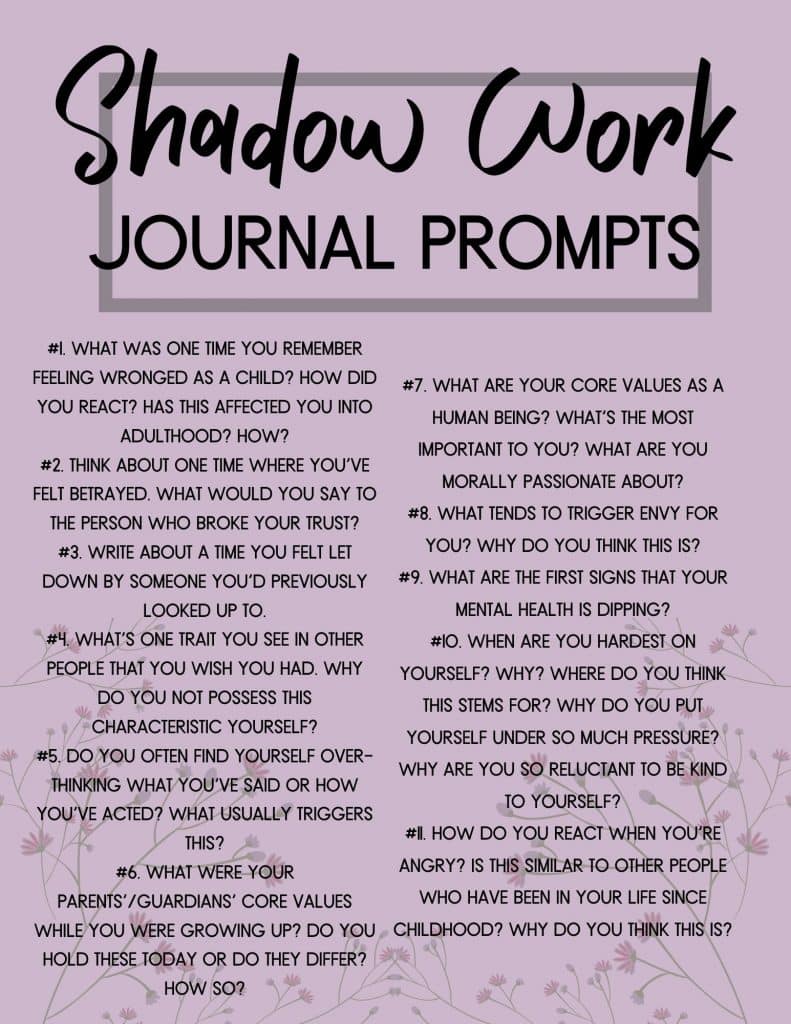100 Shadow Work Journal Prompts For Healing, Self-Awareness & Growth
Shadow work journal prompts are an amazing way for beginners to improve self-awareness and work through past traumas, events, and emotions, as well to get to know themselves as human beings much better.
Discovering and exploring your shadow self so that you can learn self-acceptance, boundaries, and healthy coping mechanisms is a form of self-care in itself and, to be completely honest, it’s been completely life-changing for me.
Shadow work has totally changed my mindset and improved my mental health.
Knowing where to start can be tricky though – I totally get that, which is why using journal prompts to get started can be really helpful.
What is shadow work?
The term ‘shadow work’ refers to the practice of working through and learning to forgive your shadow self.
Your shadow self is the side of you that you tend to hide from others and keep out of sight, hence the name.
The Shadow is one of main archetypes that Swiss psychologist, Carl Jung, focused on the most, along with the Self, the Persona, and the Anima/Animus. These archetypes are defined as universal, primal symbols and images that derive from the collective unconscious.
Jung’s Shadow archetype is often likened to Sigmund Freud’s theory on the Id. In 1923, Freud theorised that the human psyche is comprised of three parts: the Id, the Ego, and the Superego.
The Id according to Freud, was the primitive part of the psyche responsible for sexual and aggressive drives, as well as hidden memories.
The Superego is the moral conscious, while the Ego acts as the go-between.
Freud’s Id and Jung’s Shadow contrast in certain aspects because Jung believed that not all Shadow traits were inherently negative and could even result in creativity, while Freud believed that the Id was primitive and purely driven by instinct.
According to Jung, our Shadow is the side of us that the ego doesn’t identify with; the ‘darker’ side of our personality. While the traits that make up our Shadow as usually perceived to be negative – as our ego has hidden them for a reason – they can also be positive, as having low self-esteem or anxiety can cause us to unnecessarily reject certain aspects of ourselves that we’ve been taught are bad.
For example being extroverted, impulsive, and fantasising can also be part of the Shadow, but aren’t necessarily negative traits. Some of us as children are just taught that we should be quiet, timid, and rational, and therefore view these as traits that we should bury.
‘Modern’ shadow work refers to discovering these shadow traits, forgiving ourselves for them, healing from past trauma that may have caused them, and processing them in order to grow.
We tend to see shadow traits in other people pretty easily, but when it comes to our own shadow self, it takes a little introspection.
Shadow traits that your shadow side might possess include:
- Anger/Outbursts of rage
- Envious/Jealous
- Manipulative/Exploitative
- Selfish/Self-centred
- Arrogant/Egotistical
- Obsessed with appearance/how other people see them/dependent on praise
- Intolerant
- Judgemental
- Defensive
- Overly competitive
- Stubborn
Shadow work is basically a deep-dive – usually through meditation and journaling – into what makes us tick and why.
Our shadow self usually begins to develop in childhood when we’re especially susceptible to soaking up the attitudes and energies of our environment, as well as experience trauma that we’re not yet equipped to deal with.

With this in mind, shadow work can be really, really uncomfortable – TRUST me. You have to be vulnerable and super-honest with yourself, and that doesn’t always feel good. After all, this is why we’ve suppressed and hidden this shadow self for so long.
(This is why I put together a Shadow Work for Beginners Workbook to make the process a little less overwhelming.)

Thinking about our upbringing, environment growing up, trauma, and parents’ impact on our entire being because of their own toxic traits is also an immensely humbling experience. You finally realise that the people who raised you are also human and also have their own shadow selves.
This was a tough pill for me to swallow, but that’s for me to unpack during my own shadow work.
Saying all this: Learning about who you are as a person – warts and all – as well as how you’ve acquired your toxic traits and how to work through them is SO rewarding and useful.
Eventually, the goal is for you to learn to forgive yourself for your shadow traits, come to realise why you have these less desirable attributes, accept the sides of yourself that you might have kept hidden in the past, and move into a much happier, more accepting mindset.
Humans aren’t perfect and we should never stop learning, especially about ourselves.
Shadow work is ultimately deep-diving into your own toxic traits and why they came about. It helps us learn about who we REALLY are as people, grow, and reach true self-acceptance.
Figuring out how to recognise, process, and work on my shadow traits going forward is now one of my most crucial parts of self-care.
I have some shadow work worksheets for you totally free via the signup form below to get you started.
100 days of shadow work prompts for beginners
Here I’ve provided 100 days of shadow work prompts so that you can work through one at a time during your journal practise.
These prompts cover self-compassion (a crucial yet often forgotten part of shadow work); past trauma; healing your inner child; and meeting your shadow.
Choosing one journal prompt at a time not only makes the process a little more straightforward, it makes it much less overwhelming and easier to process.
- Do you struggle with showing yourself compassion? How does showing yourself compassion make you feel?
- When was the last time you truly gave yourself grace and forgave yourself for a mistake? What was the mistake?
- What are five self-care activities that make you feel safe and secure?
- Write about a time when someone else showed you compassion. How did it feel?
- Write about a time you showed someone else compassion. Why, and how did that feel?
- When are you hardest on yourself? Where do you think this stems from?
- Why are you so reluctant to be kind to yourself?
- Write about a time you put yourself under unnecessary pressure. Why do you think you did this? Were you put under pressure by parents/caregivers?
- What situations make you feel less than or not good enough? Why do you think this is?
- Write about a time you messed up and needed forgiveness. How did this play out?
- What types of body movement feel good to you?
- What are three ways you can be kind to yourself today?
- How do you set and enforce boundaries? What are your boundaries?
- How do you feel when people overstep your boundaries?
- What are three main goals you want to achieve with shadow work?
- What Jungian archetype do you most identify with and why?
- When you really think about it, is there anything you’re currently in denial about and avoiding?
- What does “love” mean to you?
- Have you ever found yourself manipulating others to protect yourself? When did this start and how does this make you feel?
- What’s one regret you have? Why is it a regret? How do you feel about it? Is this something you can correct in future?
- Did your parents show you compassion and forgiveness as a child?
- What were your parents’/caregivers’ morals and values? How do your own morals and values reflect these today, and why do you think that is?
- How was your relationship with your parents/caregivers?
- How is your current relationship with your family?
- What was one time you can remember feeling wronged as a child? How did you react? How has this affected you in adulthood?
- What are your core values as a human being? What’s more important to you? What are you morally passionate about?
- How do you perceive failure? How does it make you feel?
- How did your parents react to failure?
- What parts of your parents/caregivers do you see in yourself? When did this become apparent and how does it make you feel?
- What toxic traits have you noticed in your parents?
- How does this statement make you feel? “Parents are human beings. They aren’t perfect or super-human. They make mistakes and mess up just as much as you or I.”
- How did you process emotions as a child?
- How did you process emotions as a teenager?
- How did you process emotions as a young adult?
- How do you process emotions now? Has this changed over time? How?
- What are your preconceptions about femininity? What do you think this is? Where do you think this came from?
- What are your preconceptions about masculinity? What do you think this is? Where do you think this came from?
- How were you taught to deal with emotions as a child?
- What’s a question you had as a child that never really got answered?
- What is something you’ve always wanted to confront someone about, but didn’t? Why didn’t you confront them? How do you feel about that now?
- Write about a time someone you trusted betrayed you. How did it make you feel at the time? How do you feel about it now?
- Write about a traumatic event that happened in your life. How has it impacted you?
- Write about a massive life event that you truly feel you’ve moved on from. How do you think you managed to do this on this occasion?
- If you could speak to someone who broke your trust now, what would you say to them?
- Write about a time you felt let down by someone you looked up to.
- How do you feel about who you are as a human?
- What is your attachment style? How do you think this formed?
- Do you struggle to form healthy attachments within your relationships? If so, why?
- Would you call yourself self-destructive? If you do, how do you engage in these behaviours?
- When you feel emotional pain, how do you make it go away? How do you feel about this?
- Write about one person you’ve never forgiven. What did they do? Why do you still hold a grudge? Do you want to forgive them someday but can’t bring yourself to?
- When you feel emotional pain due to past trauma, where in the body do you feel it’s stored?
- What is one thing you can do today to release some of the trauma in your body?
- What is the most hurtful thing anyone has ever done to you?
- What is the most hurtful thing you’ve done to yourself?
- How do you move forward after hurting someone else?
- What’s the biggest promise to someone else that you’ve broken?
- What’s the biggest promise to yourself that you’ve broken?
- Have you ever had your heart broken? Write about it. How do you feel about it now?
- Have you ever broken someone else’s heart? Write about it.
- How do you fill your time when bored?
- How would you LIKE to fill your time when bored?
- What gives you enjoyment? Write at least five things.
- Who were your heroes growing up? What did you admire about them?
- What’s the meaning of life, to you?
- What was the last argument you had about? How did you react? How do you feel about it now? Was it resolved?
- How do you feel about confrontation? Why do you think this is?
- What was one way you used to self-soothe when you were growing up?
- What were your hobbies when you were younger?
- What are some ways you can bring activities you enjoyed as a child into adulthood?
- If you could speak to your child-self now, what would you say?
- How does thinking about yourself as a child make you feel?
- When you feel threatened or cornered, how old do you feel? Did anything traumatic happen at this particular age?
- Do you often experience physical reactions to emotional stress? If so, write about these.
- If I told you to sit with your feelings instead of avoiding or numbing them, how would this make you feel?
- Are you more prone to fighting, flying, freezing or fawning? Why do you think this might be?
- How do negative experiences impact your intimate relationships?
- What are your “comfort movies” or TV shows?
- How often to you find time to yourself? Do you wish to improve this? If so, how can you?
- What are your limiting beliefs and how do you plan to overcome these?
- What are three traits in others that you dislike?
- Do you have a tendency to project traits you don’t like onto others because you potentially possess them yourself? If so, which traits and why do you think this is?
- What are some shadow traits that you know you possess? How do these make you feel about yourself?
- Why do you consider certain shadow traits you possess to be ‘negative’?
- What’s one trait that you see in other people that you wish you had and why?
- Do you often find yourself overthinking things you’ve said or how you’ve acted? What usually triggers this?
- What tends to trigger envy within you? Why do you think this is?
- If your shadow was a separate person, what would you say to them?
- How do you react when you’re angry? Does this reaction reflect the way you saw others react to anger growing up?
- What triggers you? Can you identify your main triggers?
- Do you ever find yourself acting ‘out of character’? When does this tend to occur the most?
- What are your toxic traits? How do they present themselves?
- What aspects of yourself would you like to improve? Why? How do you plan to do this?
- Has anyone else ever pointed out areas that you need to improve? What were these? How did this make you feel?
- What emotions do you tend to avoid feeling?
- What negative emotions are you actually quite comfortable sitting with? Why might this be?
- What is the biggest lie you’ve ever told someone else? How did it make you feel to tell it? What were the ramifications of this lie?
- What’s one lie you tell yourself consistently? Why do you tell it?
- What misconceptions have you harboured in the past? Where did they come from?
- What does the term “shadow work” mean to you?
I have a whole Shadow Work Workbook for beginners, if you want a little extra help getting started with your journey.
The 100+-page journal is stuffed full of shadow work journal prompts, exercises and explanations, so people find it really helpful, especially at the beginning of their shadow work journey.
Why should we use shadow work prompts?
By suppressing our shadow selves, we’re not learning to work through our issues and become better human beings, we’re simply allowing our certain traits to fester and grow.
Jung believed that this would result in the Shadow taking charge and pushing other, inauthentic traits to the surface, as well as projecting these unwanted traits onto other people, which can hamper relationships.
This is not only exhausting, it can cause mental health issues like depression and anxiety, as we wrestle with the parts of ourselves we don’t want others to see, and, as a result, fail to work through them.
We learn to resent and hate these parts of ourselves, which impacts our mindset and self-esteem, and can even affect how we treat others, as well as ourselves.
For me, learning how to notice my shadow traits, understand them, work through them and forgive them has been amazing for my mindset and mental health.
Processing emotions in a healthy way as they arise and the concept of ‘feeling to heal’ in general has been difficult for me. I tend to like to gloss over, hide and stuff down anything negative, which results in toxicity rearing its head later on.
Learning where my toxic, shadow traits have come from, how to work through them, and ultimately forgiving myself for being human has been liberating and uplifting.
Therefore, while challenging, recognising, accepting, and unpacking my toxic traits has been nothing short of life-changing.
I found that a lot of the symptoms of depression, anxiety, and other mental health issues that I experienced were the result of me not working through my shit properly.
I now include shadow work in my self-care routine.
Self-care is calling yourself out on your own BS and learning how to deal with it, as well as self-awareness, self-love, processing past trauma, identifying and dealing with triggers, and self-acceptance.
What does shadow work mean spiritually?
While I’m a firm believer that you don’t need to be spiritual to practise shadow work since learning self-acceptance and positive coping mechanisms is basically free therapy*, shadow work is closely linked with connecting with your true, higher self.
Shadow work is thought to raise your frequency, which means that you’ll align with and attract better things, and manifest your dreams more easily through the Law of Attraction.
However, as I said, shadow work isn’t just for those looking to reach a high state of consciousness, it can also be an amazing act of self-care and self-awareness.
*While I would never advise against therapy, I’m also very aware that good therapists are not accessible, available, or affordable to most people, which is one of the reasons I started this blog in the first place.
Another practise that’s closely linked with spirituality is repeating positive affirmations. I have a whole post on shadow work affirmations, if you want to check it out.

How do I find my shadow self?
Carl Jung believed that we encounter the Shadow in our dreams. However, most people find that a combination of daily meditation to help mindfulness and keeping a shadow work journal for introspection and soul-searching is the best way to get in touch with their shadow self.
If you’re new to shadow work – or even if you’re not, to be honest – shadow work prompts can be amazingly useful when it comes to accessing past emotions and memories in order to work through them.
Often, just writing stuff down can feel really cathartic, as if you’re literally pulling the toxic thoughts from your mind and pinning them to paper.
When talking to your shadow self, my top tips in order to get the most out of your shadow work prompts are:
- Be totally authentic and honest – even if this feels uncomfortable.
- Dig deep into your emotions – no one has to ever read what you’re writing, so let it spill onto the page.
- Embrace any unexpected thoughts/emotions that come up and write about them too (if you need to cry, CRY! We embrace emo hours here!).
- Write down everything – even if you don’t think it’s important now, it might be later.
- Use shadow work journal prompts to get you started and help the thoughts flow.
- Recognise your shadow traits from your responses to the shadow work questions.
- Meditate before shadow work to help boost mindfulness and after to calm your mind.
- Practise self-care afterwards.
- Don’t pressure yourself to write lots if it doesn’t feel right.
- Be gentle and forgiving with yourself – you’re only human.
Shadow work is exactly that: work.
You’re treating wounds that still haven’t fully closed from childhood and learning to face the demons that don’t just reside in you but are PART of you after years of suppression. This isn’t easy and it’s certainly not fun, but it is rewarding.
As humans, we’re all works in progress. None of us are perfect.
Learning how to deal with our own shadow self is immensely personal, so I’ve tried to make my top tips as general as possible.
True shadow work takes time, perseverance, bravery, honesty, and self-awareness.
How to do Shadow Work
The best way to do shadow work, in my opinion, is by using shadow work prompts.
One of the main ways to practise shadow work is through introspection: asking yourself deep questions that delve into your past, analysing your way of thinking, and digging for answers that you don’t particularly want to uncover.
This is where true healing and growth occurs.
Most people can’t do this on the fly, which is why using shadow work questions or prompts comes in handy.
All you need to do is grab a blank notebook or journal, make a note of the journal prompts in this blog post, and choose one to get started.
They get your thinking and, if you keep a shadow work journal, can help you sort through your shadow traits, where they come from, and how to move forward.
Other methods of shadow work include:
- Meditation
- Self-awareness when negative feelings occur (asking yourself what exactly you’re feeling, why this is, and where this feeling comes from is really beneficial)
- Taking responsibility (while also practising forgiveness)
- Practising empathy and seeing yourself from other perspectives
- Being honest with yourself
- Hiring a shadow work coach
- Keeping a shadow work journal
What is a shadow work journal?
A shadow work journal is a journal you have for shadow work. (Shocking, I know.)
It doesn’t need to be anything special – just a plain notepad that you keep separate and safe will do.
It’s totally up to you whether you share your shadow journal with other people. You might want to discuss it with a therapist or trusted person; you might not even want to tell a single soul.

How do you use shadow work prompts and questions?
While shadow work journal prompts are optional, they’re REALLY helpful when it comes to getting you started, whether you’re a beginner or not.
Shadow work can feel like a bit of a vague term when you’re a beginner and sometimes knowing where to even begin in your journey can feel like an impossible task.
This is where the shadow work prompts come in.
These journal prompts are designed to trigger emotions, memories and experiences – often from childhood – that still unconsciously or consciously affect you to this day.
The prompts will then encourage you to expand on this feeling, thought or story so that you can further understand where it originates, how its manifested in potentially toxic traits today, and therefore how to understand yours thoughts, actions, and boundaries going forward.
Some shadow work prompts will ask you to dive deeper than others and may feel really uncomfortable, which is why I encourage you to practise meditation and self-care afterwards in order to process anything that’s come up and calm your mind.
As well as using journal prompts, be sure to hold yourself accountable and call yourself out if you catch yourself engaging in toxic behaviours, especially if they affect other people.
Furthermore, don’t just call yourself out in the moment, but explore why you’ve reacted or felt the way you have.
Is this something you need to work on?
Journal about how you can deal with similar situations in the future.
For example, if you’ve lashed out at someone close to you for a seemingly irrational reason (that will probably make total sense to you after journaling), how can you react in a calmer, more rational way if this happens again?
This is how real growth is made.
If you want you’re ready to meet the real you and learn to love who you truly are at your core, check out my shadow work workbook.
It has 100+ pages of prompts, exercises, explanations and guidance for your shadow work journey.

A witchy ray of sunshine who loves to help others on their journal journey. I’ve been journaling since childhood and have since gone on to earn a degree in English and a diploma in Shadow Work. I love my plant babies, yoga, and anything spooky. Find out more on my about me page.
One Comment
Comments are closed.